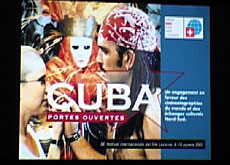
Swiss open doors for Cuban film-makers

Cuban directors are getting a helping hand from the Swiss government with selling their films to the rest of the world.
The Swiss Agency for Development and Cooperation (SDC) has stumped up SFr550,000 ($405,000) to assist film-makers from poorer countries.
The three-year “Open Doors” programme will allow Cuban directors to show their finished work at the Locarno International Film Festival and bring them face-to-face with European producers to pitch new projects.
“The idea is to foster a better understanding of and to promote cooperation with the Cubans, who are suffering from political isolation and an economic crisis,” said SDC spokeswoman Sophie Delessert.
The SDC is also providing funding for a group of young Argentine directors to show their work at the festival, as well as sponsoring the renowned EICTV Film school in San Antonio de los Banos, Cuba.
Seven Cuban directors have been invited to participate in the Open Doors programme.
Camilo Vives from the Cuban Institute for Cinematography rejected the suggestion that the content of the films might be subject to censorship by the country’s authoritarian government.
“We film-makers have never set out to glorify our system or our ruler, as is the case in many other countries,” he said.
“The only kind of censorship we have suffered over the past few years is economic, and it has left many films just sitting there, waiting to be completed.”
Low output
The Caribbean island’s output has dwindled to an average of four films per year.
Unfortunately for the Cubans, their films – many of which were commercial hits in Havana – were shown in the early morning festival slot at one of the least accessible venues.
And video copies were not available at the festival library for those who had missed the screenings.
However, moviegoers who saw the films were enthusiastic about their quality, and directors attending the event seemed grateful for the chance to pitch their projects.
Humberto Padron, whose gripping “Video de Familia” was made for less than $400 (SFr545), is hoping to secure funding to transfer the film onto 35mm.
After a day of talking to western producers, he was optimistic about his chances of finding a partner.
Low-budget films
Humberto Solas, director of one of Cuba’s most famous movies, “Lucia”, needs just $100,000 to complete his present project – a snip by Hollywood standards.
“It hurts my pride a little to come here asking for help, but when I read about the problems [the Italian director Federico] Fellini had getting financial support for his films, I see that many of us are in the same predicament,” said Solas.
Solas is director of an annual no-budget film festival in eastern Cuba, and is fighting for digital film formats to be used for general release, eliminating the need for expensive transfers to 35mm.
Simon Perry, chairman of the European Film Academy, launched Open Doors with a summary of the financing opportunities that could be available to the Cuban film-makers.
Asked why the eight producers invited to the event should favour Cuba over other countries facing economic crises, he explained:
“We have no particular preference for any country. The producers here today have been asked to focus on Cuba and, if they find projects they love, they will make them there.
“Cuba does seem to be a very good place to make pictures in terms of the skills and facilities available, and low costs.”
swissinfo, Julie Hunt in Locarno
The Open Doors project aims to promote cinema industries going through a crisis.
Cuba’s film output has declined to an average of four per year, as a result of economic problems.
The Cuban economy is suffering under a United States-imposed trade embargo, encapsulated in the Helms-Burton Act.
Hundreds of Cubans every year risk their lives to flee to the US, in search of a better life.

In compliance with the JTI standards
More: SWI swissinfo.ch certified by the Journalism Trust Initiative
















![The four-metre-long painting "Sonntag der Bergbauern" [Sunday of the Mountain Farmers, 1923-24/26] had to be removed by a crane from the German Chancellery in Berlin for the exhibition in Bern.](https://www.swissinfo.ch/content/wp-content/uploads/sites/13/2025/12/01_Pressebild_KirchnerxKirchner.jpg?ver=14ffbad8)














You can find an overview of ongoing debates with our journalists here . Please join us!
If you want to start a conversation about a topic raised in this article or want to report factual errors, email us at english@swissinfo.ch.